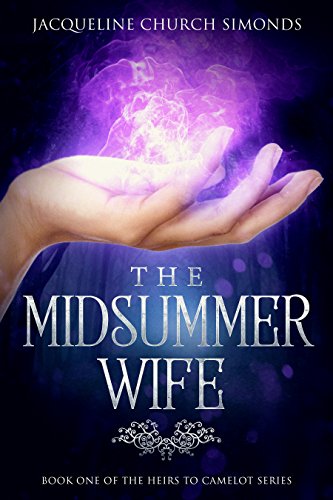

This week we have Jacqueline Church Simonds here to tell us about her series The Heirs to Camelot. The series has these 3 books, including one only released last week.
- The Priestess of Camelot (prequel): https://amzn.to/2QgKSg8
- The Midsummer Wife: https://amzn.to/2IM1qgS
- The Solstice Bride (released 11/5): https://amzn.to/33Qvr5E
Can you describe your world or setting?
The series is set 20 – 50 years in the future, in post-apocalyptic Britain. The prequel is set in 500 CE Britain (King Arthur’s time). The main series is set 1460 years after King Arthur’s time, or 61 generations from King Arthur and Merlin.
The legacy of these families is that the heirs must be prepared for a Time Foretold when something grave will happen. Morgaine will somehow be involved. Besides that, they have little information besides a lot of relics of King Arthur’s time. Things go poorly, as they do.
It is a fairly familiar world—meaning it works the way readers are familiar with. It’s just that there are things going on that have been hidden from the everyday human.
How did you build this concept, what research did you do?
I did a fair amount of research into Arthurian legends. I’ve studied how populations react to a major catastrophe. I’ve also studied how people react to an autocratic/dictatorship. The surprising discovery is that most will not react at all to horrific rulers. They are just trying to get along, no matter how bad things get. Being a member of the Resistance usually requires some “inciting incident.”
Why did you choose this setting?
For the prequel: I am a King Arthur “fangirl”; always have been. I loved reading the many legends of King Arthur that we don’t usually delve into. As to apocalyptic Britain, that had to be the “Time Foretold” to bring forth the heirs to Camelot.
What’s unique about your world?
It’s a pretty mundane world (besides the whole apocalypse and 1500-year-old angry despot running things). There are reincarnated legends and people able to harness “magic.”
How do you explain the magic in your world?
The magic is a psychically-based power unlocked by the practitioners of a certain “religion,” that of the Goddess (who may actually be an alien, rather than a deity).
What was the most surprising thing you found out while researching/writing your latest book?
I discovered lesser-known legends of King Arthur, and incorporated them into the series.
How do you handle the food in your world?
Food is a hugely important part of our socialization, so it’s critical to include it in world-building. In The Priestess of Camelot, Anya eats meat and other foods she would not ordinarily (because she is a priestess). Usually in these settings, she is listening to others tell about themselves.
In The Midsummer Wife, which is set in the not-too-distant-future, I use food to show class (eating at a fine-dining establishment when many others have nothing), and demonstrating the lead character’s problems with food due to her nervous disorders.
In The Solstice Bride, The main character goes from having anything at all, to eating a sort of burnt gruel and facing food scarcity. It forces her to realize that she has been cosseted in a world of want.
Do you have a recipe that you could share, maybe one that our readers could try, based on the food in your world?
Alas, I am not a cook. I can boil eggs and make toast. I am a true trencherwoman, though! I shared with fellow author Claire Buss the Chocolate Espresso Fudge Cake to which I am addicted. It’s from the book Death by Chocolate; you can access it here: https://bit.ly/32tmyhC
What was the most mundane item that you used that really has cool tech or magic behind it?
All of the main characters can produce a flame in their hands. This is merely a concentration of the electro-chemical forces in one’s body. So, yeah, if we could figure out how to control it, this is a possible piece of “magic.”
What did you include that you wish was real today?
I wish I had control of my psychic power the way the characters do. While I experience some déjà vu, I don’t have anything like what the folks in my books can accomplish.
Links:
- Amazon author link https://amzn.to/2P3hInE
- Goodreads author link https://bit.ly/33NuHxw
- Twitter www.twitter.com/jcsimonds
- Facebook JacquelineChurchSimonds
- Blog: www.jcsimonds.com


